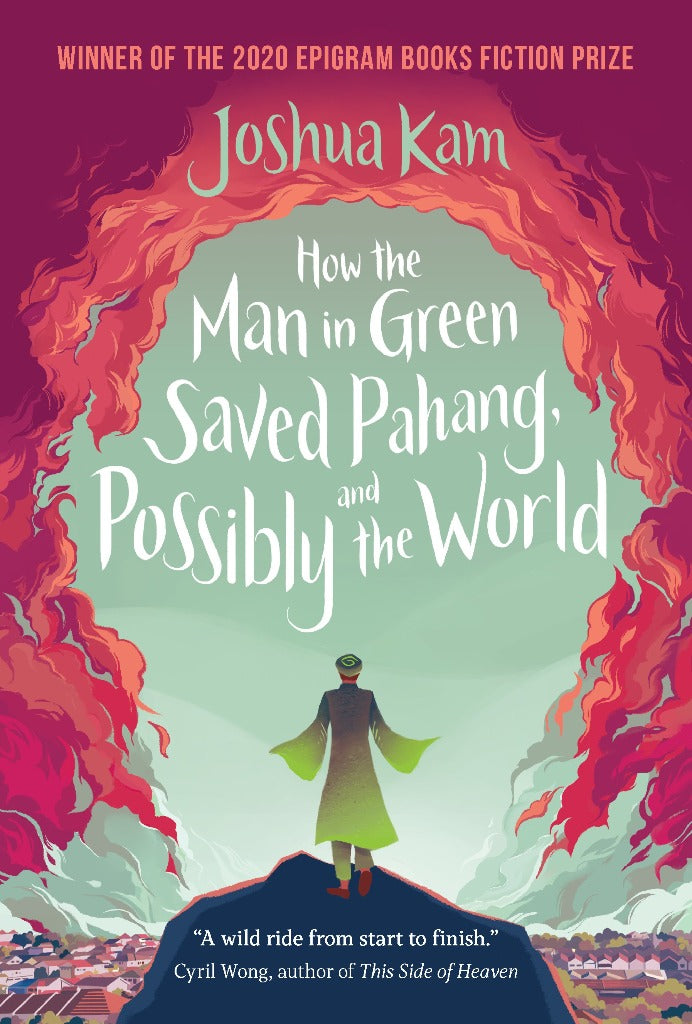
How the Man in Green Saved Pahang, and Possibly the World
- Description
- Praise
- Book Trailer
- About the Author
-
*Unsuitable for the Young*
Winner of the 2020 Epigram Books Fiction Prize
Look inside the book | Get the E-book | Listen to the audiobookWhen a renegade prophet vanishes in a cloud of pigeons in Kuala Lumpur, chorister and first witness Gabriel finds himself press-ganged into a wild road trip down the Malaysian coast. Meanwhile, in a sleepy town by the sea, Lydia traces the links between her late grandaunt’s eccentric lover and her involvement in the Communist Emergency. As Lydia and Gabriel enter a shadowy mythology of serpents, Sufi saints and plainclothes gods, they must grapple with the theologies and histories they once trusted, in a country more perilously punk than they’d ever conceived of.
-
"A dizzying tale of saints, heists, maybe-queens." —The Straits Times
"Quite the debut, accomplished, deft, unabashed and exuberant." —Asian Review of Books
"What’s refreshing about How the Man in Green Saved Pahang, and Possibly to the World is how it is both rooted in Malaysia, but offers new imaginings of it ... It’s quite the whirlwind tour through Malaysian history. Spirits and gods become characters, architectural landmarks become sites of magic, history is given life."—Lily Jamaludin, Queer Lapis
"Author Joshua Kam’s debut book brings Asian mythology to the forefront."—The Sun Daily
Malaysian author blurs myths and truths as you escape on a wild road trip ... This whimsical, rollercoaster ride of a book also carries a tale of old and new Malaysia colliding, with various figures from local history, politics and folklore coming together in an epic quest for the soul of the nation.—newsday24.com
"In essence, (the novel) acts as a love letter to Malaysian folklore and history, showcasing an impressive degree of representation and imagination that never feels shoehorned into the narrative."—Bakchormeeboy
"What a trip! This 21st-century adventure quest with an Islamic saint also brings us on a madcap tour through a multitude of Malaysian mythologies— Malay epics, Taoist pantheons, WW2/Emergency/Merdeka heroics, and more. Even more vitally, it gives us hope amidst the dire news of our era— political corruption, environmental devastation and bigotry—reassuring us that the human/divine spirit still flourishes in the late-capitalist tropics, and is ultimately destined to triumph over evil. An absolute delight, and truly, deliciously Malaysian.” —Ng Yi-Sheng, award-winning author of Lion City
“Borgesian, even Manichean in spirit, with almost reverent borrowings from Nusantara mythologies to Abrahamic religiosity, this novel is a wild ride from start to finish, riffing on Malayan history, politics and folklore in a surprisingly redemptive arc, while remaining deeply interrogative about what it means to keep true to goodness in the ever-changing face of evil.” —Cyril Wong, two-time Singapore Literature Prize-winning author of This Side of Heaven"Really enjoyed delving into the depths of Malaysia through this story. It's a very ambitious novel.”
—Balli Kaur Jaswal, author of Sugarbread, Inheritance and Erotic Stories for Punjabi Widows -
-
Joshua Kam Chun Wah grew up in Kuala Lumpur, Malaysia, taking frequent trips with his father down the coastal state of Pahang. A history graduate of Hope College, Michigan, he’s developed a hunger for the mythology of place-names, rebel peasants, and sea gods his family inherited from generations by the water. Dividing his time between Malaysia and graduate school in Michigan, he interviews Nusantara mystics for a living, bakes when he can and drinks when he shouldn’t. How the Man in Green Saved Pahang, and Possibly the World is his first novel.
Cover Type: Paperback
Page Count: 272
Year Published: 2020
Size: 152mm x 225mm
Language: English
